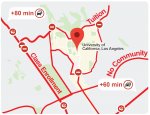Think back to a moment of self-doubt you’ve experienced in university. Perhaps you’re gripping your notes with sweaty palms in seminar, dreading your turn to give a presentation. Or maybe you’re nervously bouncing your leg against your desk as you raise your hand to answer the professor’s question.
In that moment, you may have felt like a fraud on the verge of being caught, pretending to know something you don’t or be something you’re not.
Some students, especially transfer students, are never able to escape these feelings.
Many transfers are first-generation college students who come from historically underrepresented minority communities. The transition from community college to a fast-paced, demanding university like UCLA can be jarring, leaving many students prone to impostor syndrome – the idea they don’t belong on the campuses they’ve earned a place at.
It doesn’t help that the UC doesn’t put in the work to mitigate this concern.
For starters, not all transfer students have access to a dedicated transfer center. UCLA’s transfer program only gained access to rooms on campus in 2017. Transfer centers at UC Irvine and UC Berkeley still share space with other organizations. The resources these centers offer also differ: UCLA’s transfer center hosts a part-time academic adviser 10 hours per week, while UC Santa Barbara’s has two full-time academic advisers.
You can blame these differences on administrative laziness. The UC has shown it prefers to sit back and leave staff and student advocates to design and implement support programs themselves. This reliance on bottom-up advocacy instead of top-down institutionalized support means the burden of providing resources to transfer students falls on individual campus leaders – even on students themselves.
But transfer students have the same fundamental needs regardless of which school they’re attending – needs that aren’t being met. Inclusivity includes a financial commitment, and the UC’s failure to ensure each of its campuses provides the same basic support for transfer students shows a reluctance to fully integrate transfers into the community.
Sam del Castillo, a doctoral student in the department of counseling, clinical, and school psychology at UCSB who also attended the university as a first-generation undergraduate transfer student, began organizing workshops on campus, while completing their doctoral work, to help students with impostor syndrome. These workshops, based on clinical research, help transfer students build a community and develop a healthier, growth-focused mindset.
But it’s not students’ job to ensure the University provides basic support. Students pay tuition to UC campuses assuming the money will fund student resources.
“It is not efficient or sustainable to have students manage these support programs,” del Castillo said. “Universities need to structurally and systemically incorporate these programs so that this support continues.”
While del Castillo has received support for these workshops from the UCSB Transfer Center and the Opening New Doors to Accelerating Success Student Center, they have had to pay for workshop-related expenses from their own savings.
This is a simple, effective program UCSB and other UC campuses should have already had in place.
The failure by system-level administrators to address widespread transfer student issues like impostor syndrome puts additional strain on other campus resources, with students paying the price.
“Psychological support on campus, like (Counseling and Psychological Services), is overwhelmed. That is a consequence of not addressing issues like impostor syndrome,” del Castillo said. “If you don’t start with preventative work, you will deal with the more severe consequences like anxiety, depression and suicidality.”
Transfer students are experiencing these issues at each UC.
“When I first arrived at UCLA, feelings of impostor syndrome made me less likely to participate in class and in office hours because I was afraid of sounding stupid,” said Yaffa Yermian, a history student who graduated from UCLA in 2018.
When transfer students feel like impostors on campus, they are less likely to engage in campus discussions, explore opportunities on campus and make use of support programs. This makes our dialogue less diverse, less welcoming and less inclusive, brewing a toxic sense of separation between communities on campus. So long as system-level administrators ignore that reality, they’ll continue to fall short of their commitment to inclusion.
Campus-level administrators realize this is a big issue. Malaphone Phommasa, the director of Academic Success Initiatives at UCSB, said academic performance is connected to the way students feel outside the classroom.
“You blink and you’re graduating,” Yermian said. “I know there are resources for transfer students at UCLA, but it is hard to track down these programs while you’re adjusting to a new environment.”
Existing programs need to be made more visible. The transfer center at UCLA, for example, offers peer mentoring programs that help students build long-lasting support networks.
“We would like to strengthen this model by clarifying what our messaging is to transfers, what our goals are for transfers and by streamlining navigation tools to help transfers connect with existing resources,” said Heather Adams, director of the UCLA Transfer Student Program.
Adams and her team have done incredible work creating support programs for transfers alongside their colleagues at other UCs. But the prevalence of issues like impostor syndrome among transfer students at large proves the UC must expand its commitment by providing permanent funding and ensuring available space for transfer centers with full-time academic advisors and support staff if it hopes to truly include transfer students in its community.
Transfer students deserve to be here. And they deserve an institutionalized support structure that guarantees them the same opportunities across the UC system.
It’s high time administrators delivered on that promise.
